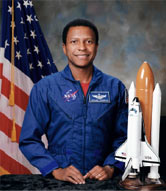Michael P. Anderson
|
|
Michael P. Anderson (December 25, 1959 - February 1, 2003) was a Lieutenant Colonel (USAF), a NASA astronaut and the Space Shuttle payload commander of STS-107 (Columbia) who was killed when the craft disintegrated after reentry into the Earth's atmosphere.
| Contents |
Personal data
Born December 25, 1959, in Plattsburgh, New York, but considered Spokane, Washington, to be his hometown. Died on February 1, 2003 over the southern United States when Space Shuttle Columbia and her crew perished during entry, 16 minutes prior to scheduled landing. He is survived by his wife and children. Michael enjoyed photography, chess, computers, and tennis.
Education
- 1977: Graduated from Cheney High School in Cheney, Washington.
- 1981: Bachelor of science degree in physics/astronomy from University of Washington.
- 1990: Master of science degree in physics from Creighton University.
Awards
- Posthumously awarded the NASA Space Flight Medal
- the NASA Distinguished Service Medal
- the Defense Distinguished Service Medal (DDSM)
- the Congressional Space Medal of Freedom.
Special honors
- Distinguished graduate USAF Communication Electronics Officers course
- Recipient of the Armed Forces Communication Electronics Associations Academic Excellence Award 1983
- Received the USAF Undergraduate Pilot Training Academic Achievement Award for Class 87-08 Vance AFB
- Awarded the Defense Superior Service Medal
- the USAF Meritorious Service Medal
- the USAF Achievement Medal with one oak leaf cluster.
- Washington State Highway 904, running through Cheney, Washington, where he graduated from high school, was renamed in his memory.
- Asteroid 51824 Mikeanderson was posthumously named after Anderson.
Experience
Anderson graduated form the University of Washington in 1981 and was commissioned a second lieutenant. After completing a year of technical training at Keesler AFB Mississippi he was assigned to Randolph AFB Texas. At Randolph he served as Chief of Communication Maintenance for the 2015 Communication Squadron and later as Director of Information System Maintenance for the 1920 Information System Group. In 1986 he was selected to attend Undergraduate Pilot Training at Vance AFB, Oklahoma. Upon graduation he was assigned to the 2nd Airborne Command and Control Squadron, Offutt AFB Nebraska as an EC 135 pilot, flying the Strategic Air Commands airborne command post code-named “Looking Glass”. From January 1991 to September 1992 he served as an aircraft commander and instructor pilot in the 920th Air Refueling Squadron, Wurtsmith AFB Michigan. From September 1992 to February 1995 he was assigned as an instructor pilot and tactics officer in the 380 Air Refueling Wing, Plattsburgh AFB New York. Anderson logged over 3000 hours in various models of the KC-135 and the T-38A aircraft.
NASA experience
Selected by NASA in December 1994, Anderson reported to the Johnson Space Center in March 1995. He completed a year of training and evaluation, and was qualified for flight crew assignment as a mission specialist. Anderson was initially assigned technical duties in the Flight Support Branch of the Astronaut Office. Anderson flew on STS-89 and STS-107, logging over 593 hours in space.
Space flight experience
STS-89 Endeavour (January 22-31, 1998), was the eighth Shuttle-Mir docking mission during which the crew transferred more than 9,000 pounds of scientific equipment, logistical hardware and water from the Space Shuttle to Mir. In the fifth and last exchange of a U.S. astronaut, STS-89 delivered Andy Thomas to Mir and returned with David Wolf. Mission duration was 8 days, 19 hours and 47 seconds, traveling 3.6 million miles in 138 orbits of the Earth.
STS-107 Columbia (January 16 to February 1, 2003). The 16-day flight was a dedicated science and research mission. Working 24 hours a day, in two alternating shifts, the crew successfully conducted approximately 80 experiments. The STS-107 mission ended abruptly on February 1, 2003 when Space Shuttle Columbia and her crew perished during entry, 16 minutes before scheduled landing. Mission duration was 15 days, 22 hours and 20 minutes.
Quotes
Prior to the final launch of the Columbia, Anderson stated:
- "There's always that unknown."
See also:
References
- NASA biography (http://www.jsc.nasa.gov/Bios/htmlbios/anderson.html)
External links
- The Chicago Alliance for Minority Participation Keynote Address by Major Michael P. Anderson (http://www.iit.edu/~iitnsf/depastro.html)es:Michael P. Anderson

